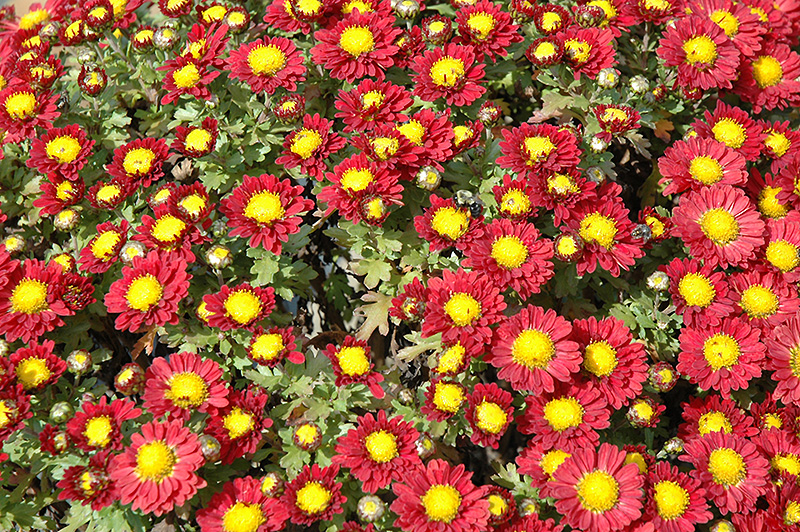VANDERMEER
PLANT LIBRARY
Find the perfect plant for your space by browsing through this extensive selection that we typically carry every year.
This library is for information purposes only.
Red Daisy Chrysanthemum
Chrysanthemum 'Red Daisy'
Height: 3 feet
Spread: 3 feet
Sunlight:
![]()
![]()
Hardiness Zone: 4a
Other Names: Garden Mum, Korean Mum, Dendranthemum
Group/Class: Mammoth Mums
Description:
Showy, red daisy-like flowers, with gold centers, cover a mound of strong, flexible stems; blooms late in the season; adaptable to various conditions; best in full sun; spreading
Ornamental Features
Red Daisy Chrysanthemum is covered in stunning red daisy flowers with yellow eyes at the ends of the stems from early to mid fall. The flowers are excellent for cutting. Its fragrant ferny leaves remain dark green in colour throughout the season.
Landscape Attributes
Red Daisy Chrysanthemum is an herbaceous perennial with a mounded form. Its medium texture blends into the garden, but can always be balanced by a couple of finer or coarser plants for an effective composition.
This is a relatively low maintenance plant, and is best cleaned up in early spring before it resumes active growth for the season. Deer don't particularly care for this plant and will usually leave it alone in favor of tastier treats. It has no significant negative characteristics.
Red Daisy Chrysanthemum is recommended for the following landscape applications;
- Mass Planting
- Border Edging
- General Garden Use
Planting & Growing
Red Daisy Chrysanthemum will grow to be about 30 inches tall at maturity, with a spread of 3 feet. Its foliage tends to remain dense right to the ground, not requiring facer plants in front. It grows at a medium rate, and under ideal conditions can be expected to live for approximately 10 years. As an herbaceous perennial, this plant will usually die back to the crown each winter, and will regrow from the base each spring. Be careful not to disturb the crown in late winter when it may not be readily seen!
This plant does best in full sun to partial shade. It does best in average to evenly moist conditions, but will not tolerate standing water. It is not particular as to soil type or pH. It is highly tolerant of urban pollution and will even thrive in inner city environments. This particular variety is an interspecific hybrid. It can be propagated by division; however, as a cultivated variety, be aware that it may be subject to certain restrictions or prohibitions on propagation.





